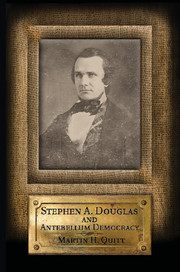Book contents
- Frontmatter
- Contents
- Acknowledgments
- Abbreviations
- Introduction
- 1 Adolescence in Vermont
- 2 Schooling, Learning, and Passing the Bar
- 3 Family Influences, Stress, and Bonds
- 4 Democratic Prodigy in Illinois
- 5 Constitutionalism, Part I
- 6 Constitutionalism, Part II
- 7 The 1860 Campaign and the Code Against Campaigning
- 8 In Lincoln’s Shadow
- 9 Douglas’s Mississippi Slaves
- Appendix Douglas’s Campaign Itinerary, 1860: June 23 to November 6
- Index
- References
2 - Schooling, Learning, and Passing the Bar
Published online by Cambridge University Press: 05 October 2012
- Frontmatter
- Contents
- Acknowledgments
- Abbreviations
- Introduction
- 1 Adolescence in Vermont
- 2 Schooling, Learning, and Passing the Bar
- 3 Family Influences, Stress, and Bonds
- 4 Democratic Prodigy in Illinois
- 5 Constitutionalism, Part I
- 6 Constitutionalism, Part II
- 7 The 1860 Campaign and the Code Against Campaigning
- 8 In Lincoln’s Shadow
- 9 Douglas’s Mississippi Slaves
- Appendix Douglas’s Campaign Itinerary, 1860: June 23 to November 6
- Index
- References
Summary
Bishop was our first teacher – a poor creature who didn’t know what else to do, so he kept school. I worked all summer, and went to school in winter, and learned my letters out of Dilworth.
Lyman Beecher (b. 1775)Although Douglas described his common-school education in Brandon in positive terms, it is hard not to view his experience as the triumph of an intellectually gifted boy over an inadequate system. The Arnold Hollow District School that he attended had all of the features that reformers in Vermont attacked. It was crowded, it grouped children of disparate ages together, it hired teachers on the cheap, and it offered a stunted curriculum. It was not the kind of school designed to motivate youths to advance their formal education. That Stephen, brilliant as he was, ended his time there wanting to take up a trade suggests how stultifying the district school could be.
The school was about a mile down the road from the Fisk farm. In the year Douglas was born the school introduced a summer session for girls, called a “woman’s school” because of the teacher’s gender. The practice of women teaching very young children and older girls during summer sessions dated in New England at least to the 1760s. It was generally assumed that women could more easily control girls and younger boys who attended summer sessions, when the older boys worked the fields. The winter term initially was called a “mans [sic] school” because of the teacher. By the time Douglas became a teenager, these labels were dropped, both boys and girls attended each session, and the committee “equally divided” public money between the winter and summer schools. In common schools young boys were able to go to summer sessions until they were old enough to labor on the farm. In 1820 the Brandon District Summer School session was extended to five months. The winter term of Vermont common schools usually did not exceed ten to twelve weeks. The Brandon district school annually contained from sixty-three to eighty-four scholars between four and eighteen years old. Population growth put pressure on the school between 1820 and 1830, when Brandon experienced a 30 percent increase that made it the fastest-growing town and fourth largest in Rutland County.
- Type
- Chapter
- Information
- Stephen A. Douglas and Antebellum Democracy , pp. 26 - 41Publisher: Cambridge University PressPrint publication year: 2012



